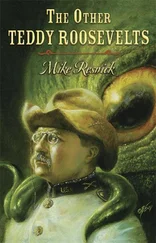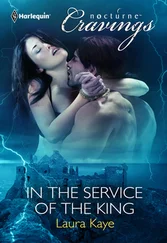“He was in a band?”
“Before he was a filmmaker, he was a bass player,” said John. “That didn’t really work out, though, and his mother had to send him money to get home from Kansas or someplace like that.”
“And what did he do before the band?” I asked, suspecting that Ted may have been through several professions by now.
“He tried art school for a while, but . . . well, you know.”
I had a feeling I did know. However, although I didn’t think Ted had much talent, he did have a lot of enthusiasm for filmmaking, and he had invested tremendous commitment and energy in ABC. So maybe he’d stick with this career choice. It made no difference to me, though, just as long as he at least stuck with it until this film was finished or the money ran out—whichever came first. I wondered how Ted’s meeting had gone this evening with his potential new backer.
We made a sharp right—and found ourselves facing a wall of carved masks, rather than a staircase.
“Ted?” I called, recalling Susan’s advice. “Ted! ”
“Up here!” he responded, his voice still pretty faint. “Find the stairs!”
“Find the stairs?” I muttered. “Well, thanks for that helpful tip.”
“This place is astonishing,” said Max. “One really can’t tell from the street how big it is.”
“ Enormous is more like it,” I said, looking down a very long aisle in hope of seeing some stairs.
“Oh, yeah, it’s a big store,” said John. “Well-known, too. I guess Yee’s has been here for at least fifty years.”
Although a fairly regular shopper in Chinatown, I had never been to Yee & Sons before. But I came to this neighborhood to buy food and practical goods at cheap prices, not art and souvenirs, so this wasn’t the sort of place I usually went into.
As I turned down a shorter aisle, then went around another corner, still without seeing a staircase, I noticed that another reason this wasn’t the sort of place I shopped was that most of the stock was well out of my price range. Some of it might even be out of Max’s price range, I realized, as I eyed an elaborate antique couch from (according to its label) nineteenth-century Hong Kong which cost tens of thousands of dollars.
This whole section of the store was a crowded jumble of gorgeous traditional furniture, most of it very high-end stuff like that couch. Carved wooden screens, hand-painted porcelain vases big enough to hide Nelli in, chairs with elaborately embroidered cushions, heavy desks, large cabinets painted with classical Chinese scenes . . .
“Wow, this place is amazing,” I murmured.
No one replied, and when I turned to look at my companions, I discovered I was alone.
“Max?” I called.
“Over here!” he called from somewhere on my left. “I didn’t realize we had gotten separated!”
“John?” I called.
“Oh, there you are,” he said behind me.
I turned around in surprise as he approached me. “I thought you were that way,” I said, jerking a thumb behind me.
“And I thought you were that way.” He nodded in the direction he had just come from. “Man, this place is really confusing, isn’t it?”
I said, “I suppose the idea is, the harder it is to find your way back out once you’re inside, the more likely you are to give in and buy something.”
John smiled at that, then he glanced at his watch. “I need to meet Bill pretty soon, so we really need to find Ted.”
“Ah-hah!” Max cried. We both turned to see him at the end of our aisle. “There you are.”
Reunited, we all went in search of the stairs again—and this time we found them. I called Ted’s name when we reached the next floor, and he answered. But when we went in the direction of his voice, we soon found that we seemed to be getting farther away from him, rather than closer.
“This place didn’t used to be such a maze,” John said in some exasperation. “It was always big, but I at least used to be able to find my way around.”
We rounded another corner—and were surprised to bump into Lily Yee. Per her daughter’s comment, she appeared to be taking inventory. Dressed in dark slacks and a pretty red blouse, with her black hair in a heavy bun at her nape again, she was carrying a clipboard and wearing a pair of reading glasses perched on her nose.
“John!” she said in surprise. “Ted didn’t mention you were coming.” Then she recognized his companions. “Hello, again! Max, how nice to see you.”
“Hello, Lily.” Max executed a gentlemanly little bow and beamed at her. “I’m pleased to see you looking so well.”
“Oh, nonsense,” she said with a smile. “I look a mess!”
It would take at least thirty minutes of makeup and hairstyling for me to look that much a “mess,” so I said nothing.
“Are you looking for Ted, er . . .” She said to me, “I’m sorry, I’ve forgotten your name.”
“This is Esther Diamond,” said John. “She’s taken over the role of Alicia in Ted’s film.”
“What? Oh.” Her face fell. “ Oh. I thought . . .” She sighed. “Well, never mind.”
I recalled that, at Benny’s wake, she had seemed to assume that Ted planned to meet me for a date, not an audition. Wishful thinking, but I could understand it. What hardworking widow with an unemployable grown son wouldn’t hope to palm him off on another woman?
“You must be the actress who Ted said would be here tonight to try on some dresses,” she said to me.
“Yes, but we’re having trouble finding him.”
“This place can be a bit of a maze,” she said with a smile. “Come with me.”
“Oh, good,” I said to John. “We have an intrepid guide to take us upriver.”
As I expected—since it was her place, after all—she led us unerringly to Ted, who was in a section of the store devoted to cheongsams, kimonos, and other clothing.
Ted, who was talking on his cell, waved to us and started wrapping up his call. “Well, I’m glad you won’t need a second surgery on the leg. And I’ll be in touch about a date to film in the apartment.”
After he got off the phone, he greeted us all.
Then his mother asked him, “Did you finish unpacking those statues from the new shipment?”
“Huh? Oh, I forgot.”
Lily’s face went very still. A lesser woman, I sensed, would have scowled at him. Speaking evenly, she said, “Ted, I really want those on the floor tomorrow. With the New Year just over a week away—”
“Sure, I’ll get to it, Mom.”
“When?”
“Um . . .”
“And I still need you to clean out that back room, too.”
“Uh-huh.”
“And don’t forget to take out the garbage tonight.”
“Okay, Mom, don’t worry.”
“You keep saying that, Ted, but then you don’t—” She looked at the rest of us and evidently decided not to criticize her son here and now. Instead, she said to him, “Please just make sure the things we’ve discussed get done by tomorrow.”
“Right, Mom.” He paused. “Um . . . what were those things again?”
With that look of resigned disappointment which I had seen before on Lily Yee’s face when speaking to her son, she said, “I will write you a list.”
“Okay,” he said cheerfully. Ted was feckless, but good-natured.
“Now I shall leave you with your friends and return to working on the inventory.”
“May I assist you?” Max offered.
“Oh, thank you, Max.” She gave him a warm smile. “That is very thoughtful. And I would enjoy your company.”
But although he seemed pleased by her response and he smiled back, I thought his expression seemed a little melancholy. Almost regretful. I wondered if he was thinking of another woman who had lived in another era, someone who had inhabited a world that must have been very different from this one. And I had a feeling he was recognizing in his heart, that organ which is such a slow learner, that despite the resemblance which drew him to her, Lily Yee was not Li Xiuying—whoever she had been.
Читать дальше











